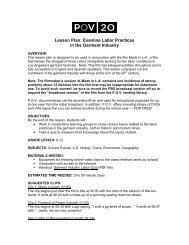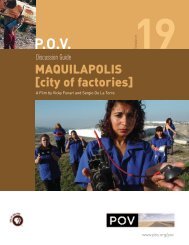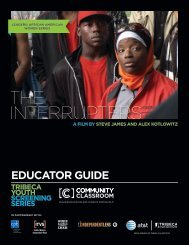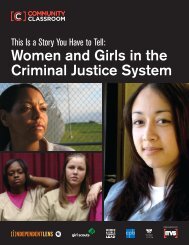The FilmEpisode TwoEpisode Two continues our journey to the hot spots of gender oppression around the world and highlightsthe courageous work of some of the extraordinary women and men who are taking a stand in the faceof incredible odds. This episode focuses our attention on the role of women in their families and theircommunities — examining the fundamental obstacles that hinder their potential, and charting the ripple effectthat results when that potential is harnessed.Veteran journalist and Half the Sky: TurningOppression into Opportunity for WomenWorldwide co-author Nicholas Kristof isonce again accompanied by a three celebratedAmerican actresses who offer freshand personal perspective on the issues ineach country. Kristof travels to Somalilandwith Diana Lane to examine maternalmortality and female genital mutilation,to India with America Ferrera to exploreintergenerational prostitution, and withOlivia Wilde to Kenya, where the transformativepower of <strong>economic</strong> <strong>empowerment</strong>is changing women’s lives and is layingthe groundwork for the next generation. Inthe process, the film considers the centralrole of women in the health and stability oftheir families and communities and establishestheir critical role in the global effortsto eradicate poverty and achieve peace.Featuring on-camera commentary fromSheryl WuDunn and some of the world’smost respected and outspoken advocatesfor gender equality — including MelanneVerveer, Zainab Salbi, and DesmondTutu − Episode Two underscores the fundamentalobstacles to women’s progressand prosperity and celebrates women’sboundless capacity to better our world.Maternal MortalityThe episode begins in Somaliland — anunrecognized country, populated mainlyby nomads, where the average womantoday has a 1-in-12 chance of dying inchildbirth. Joined by actress Diane Lane,Kristof reconnects with Edna Adan, founderof the Edna Adan Maternity Hospitalin Hargeisa. A spry 70-something womanoften and rightly described as a “force ofnature,” Adam is almost single-handedlyrevolutionizing the experience of childbirthin her country — providing medical care towomen who would otherwise have none,training midwives, and fighting tirelesslyagainst female genital mutilation — a traditionalpractice still common in much ofAfrica (and elsewhere), which severelycompromises a woman’s ability to delivera child. In Somaliland, the challengeswomen face in the developing world arestarkly apparent: Poverty and traditionconspire to undermine a woman’s health,directly threatening her life, and having alasting impact on her children’s survivaland ability to thrive.Intergenerational ProstitutionAs WuDunn and our cast of gender equalityadvocates argues, tradition is, in manyways, the greater evil. In too many placesin the world, tradition still is used to marginalizewomen, to keep them down andin their place. This vicious cycle repeatsitself generation after generation, damagingand ending lives and undermining theability of thousands of women improvetheir quality of life and live their fullpotential. The key — as Kristof and actressAmerica Ferrera discover in India — isintervention by someone from the inside:someone like Urmi Basu. A social workerand an educated, middle-class Bengali,Basu has dedicated her life to stoppingthe cycle of intergenerational prostitutionin India, where 90 percent of girls bornto sex workers follow in their mothers’footsteps. What she is up against is neatlyillustrated by one of the young girls inher care, Monisha, who is on the brink ofbeing wrenched out of school and likelysold to a brothel by her own family — afamily that belongs to a sub-caste of sexworkers. What keeps Basu going is girlslike Sushmita — and more to the point,women like Sushmita’s mother, Shoma,who has lived the utter brutality and desolationof prostitution every day of her lifeand desperately wants a different fate forher daughter. Shoma’s hope for her childis the seed of real and lasting change.Economic EmpowermentWhen women have equal control overtheir finances and the financial decisionmakingon the personal, community,and national levels, everyone benefits.WuDunn and the many contributors wholent their voices and considerable expertiseto Half the Sky: Turning Oppressioninto Opportunity for Women Worldwideall stress that putting money in the handsof a poor woman changes everything.During their visit to Kenya, Kristof andOlivia Wilde witness the impact of the<strong>economic</strong> <strong>empowerment</strong> of women firsthand.In this episode’s final segment,they explore the impact and challenges ofmicrofinance and the ways is transformingthe lives of women and those aroundthem. We begin with Jane Ngoiri, a formersex worker-turned-dressmaker who is nowable to send her four children to school,where they are each at the top of theirclass, and end with Rebecca Lolosoli, aSamburu woman who built a safe havenfor women on the slender thread of a jewelry-makingbusiness. Kristof and Wildesee for themselves the dramatic andtangible transformation that can be set inmotion by a woman with a little money ofher own and a system of support to helpher make the best use of her financial andpersonal resources. Replicate the experimentseveral million times, and the worldwill be an entirely different place.The episode — and the film — ends withan urgent call to action, an invitation tothe viewer to take up the central moralchallenge of our time, and to join a movementthat will tap the immense potentialof women to create a more peaceful andmore prosperous world for us all.Discussion guide // <strong>economic</strong> <strong>empowerment</strong>6
“We want to choose our husbands. Wewant to own the land. We want to go toschool. We don’t want to be cut anymore.We also want to make decisions. We wantto participate in politics, to be leaders. Wewant to be equal.”–Rebecca Lolosoli, Founder of UmojaIndividuals Featured in EconomicEmpowerment in KenyaNicholas KristofJournalist; Co-Author of Half the Sky:Turning Oppression into Opportunityfor Women WorldwideSheryl WuDunnJournalist; Co-Author of Half the Sky:Turning Oppression into Opportunityfor Women WorldwideOlivia WildeActress; ActivistIngrid MunroFounder of Jamii BoraJane NgoiriIndependent businesswoman;Member of Jamii BoraRebecca LolosoliCo-founder and matriarch of Umoja,a women-only villageKabeh S. SumboOwner of Passama Agriculture TradingCorporation in LiberiaSources:»»www.bbc.co.uk/news/world-africa-18574734»»ictj.org/publication/institutional-reform-newconstitution-kenya»»www.odi.org.uk/resources/details.asp?id=1522&title=crisis-kenya-land-displacement»»www.afrol.com/Categories/Women/profiles/kenya_women.htm»»kenvironews.wordpress.com/2008/09/08/a-snapshot-of-the-situation-of-women%E2%80%99s-rights-in-kenyaBackground InformationKenya Past and PresentKenya is a relatively stable African country with a truly multicultural population, whoseethnic diversity has produced a vibrant culture. It is also a country that spent 80 yearsfighting for freedom from colonial rule, only to face four decades of political corruptionthat has undermined its <strong>economic</strong> and civic development and contributed to the dis<strong>empowerment</strong>of millions of women.The colonial period in Kenya was a time of vicious political and cultural oppression and<strong>economic</strong> exploitation for the indigenous communities who had lived in that region forcenturies. In 1894, Britain declared protectorate over Kenya, and the new state’s boundarieswere drawn without the consultation of Kenya’s people. This act arbitrarily broughttogether over 40 previously independent communities into one territorial entity. The ongoingcivil unrest that Kenya faces finds its roots in the painful legacy of violence and ethnictension from the country’s colonial era.After achieving independence from Britain in 1963, Kenya’s leader, Jomo Kenyatta,consolidated the political parties under the Kenya African National Union (KANU) party,and by 1969, had banned all other political parties. He was succeeded in 1978 byDaniel arap Moi, who maintained one-party rule under KANU and remained in powerfor 24 years. In the early 1990s, violent unrest and international pressure led to therestoration of multiparty politics, but it took another decade before opposition candidateMwai Kibaki ended nearly 40 years of KANU-party rule with his landslide victory in2002’s general election.Despite President Kibaki’s pledge to tackle corruption, mismanagement of internationalaid has been a continuing issue, with some donors estimating that up to one billion dollarswas lost between 2002 and 2005 alone. In addition to high-level corruption and graft,Kenyans also face crippling daily challenges including high unemployment, widespreadcrime, reoccurring droughts, and extreme poverty, with most Kenyans living on less thanone dollar a day.For Kenyan women, poverty and pervasive traditionalism are the two major obstacles toobtaining equal rights. Although government policy, legislation, and the media favor women’srights, the traditional view of women’s low status has proven difficult to overcome.Violence against women is a serious problem, with many traditional cultures permittingand even encouraging men to physically discipline their wives. The practice of femalegenital mutilation (FGM) is prevalent, with about 50 percent of Kenyan women havingsuffered FGM. Rape is also widespread despite legal prohibitions, and there is substantialevidence that incidence of child rape is growing. Underlying all of these violations ofwomen’s rights is a deeply entrenched <strong>economic</strong> discrimination linked to cultural traditionsand customary laws that deny women the right to make decisions about their ownresources and to inherit and own land.Recent political improvements — including the new constitution adopted in 2010 thatdelegates more power to local governments and gives Kenyans a bill of rights — haveinspired cautious optimism for many Kenyans. These changes are especially importantfor women who hope to benefit from policies that seek to end gender discrimination andsupport women’s leadership and participation, such as a quota guaranteeing a minimumof 47 women members of Parliament in the National Assembly.Discussion guide // <strong>economic</strong> <strong>empowerment</strong>7
















